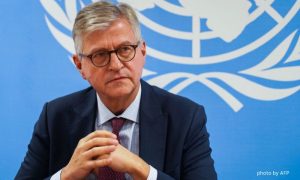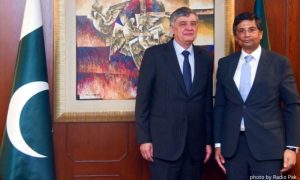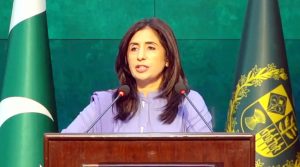TBILISI: Thousands of Georgians gathered in the capital, Tbilisi, on Monday to protest the results of recent parliamentary elections, which the opposition has denounced as “stolen.”
The ruling Georgian Dream party claimed victory, yet pro-Western opposition groups, along with Georgia’s President Salome Zurabishvili, have alleged widespread electoral fraud.
According to near-final tallies from Georgia’s electoral commission, Georgian Dream secured 53.92% of the vote, while a coalition of four opposition parties advocating for closer EU ties garnered 37.78%. The opposition has long accused the ruling party of drifting away from Georgia’s pro-European stance and aligning with Moscow.
A crowd of around 20,000 demonstrators assembled outside the Georgian Parliament building after opposition leaders called for public protests. President Zurabishvili described the election as “illegitimate” and linked the alleged fraud to a “Russian special operation.”
The President stated, “It’s very difficult to accuse a government, but the methodology is Russian,” suggesting Moscow’s “threatening” role in Georgia’s internal politics. However, Kremlin spokesperson Dmitry Peskov strongly rejected the accusations, denying any interference in Georgia’s election.
Independent election monitors reported evidence of a large-scale and complex scheme favoring the Georgian Dream. These monitors demanded the annulment of at least 15% of the votes, citing widespread rigging across multiple polling stations. They have called for an investigation.
Western leaders, including the US and the EU, have raised concerns over the election’s legitimacy. US Secretary of State Antony Blinken criticized the process, citing “vote buying, voter intimidation, and misuse of public resources” as contributing factors to what he termed an “uneven playing field.”
Meanwhile, EU representatives condemned ballot box stuffing, voter intimidation, and instances of physical assaults on observers, with some European leaders describing the vote as evidence of Georgia’s “democratic backsliding.”
Hungarian Prime Minister Viktor Orban, currently holding the EU’s rotating presidency and known for maintaining ties with Moscow, arrived in Tbilisi on Monday for a scheduled two-day visit. Defying the EU’s critical stance, Orban expressed support for the Georgian government and Georgian Dream’s election victory.
Meanwhile, Georgia’s Prime Minister Irakli Kobakhidze reiterated that EU membership remains a priority for his party. Georgian Dream has won 89 out of 150 parliamentary seats—enough to govern but insufficient for the supermajority needed to pass a constitutional amendment to ban the opposition.
Opposition leaders, accusing the ruling party of authoritarianism, have refused to accept their mandates and announced a boycott of the newly elected parliament.

























